Tips for Success Be sure to answer each question completely and accurately. Take your time, show your work, and provide a clear layout for each answer. If you're making an assumption, state that assumption and briefly explain your reasoning. Help me to follow your approach, just as you would explain to a colleague or supervisor. Background Good Foods, Inc., primarily a food manufacturer, was considering a long-range plan to undertake the manufacturing and marketing of small electrical appliances. Product Lines Good Foods marketed a wide range of food products. Among the best known were the "Ann Anderson" line of cake, frosting, and brownie mixes. Good Foods also marketed a number of cereals, flour products, frozen and refrigerated foods. The name "Ann Anderson" was one of Good Foods' prime assets. It had been carefully cultivated with over twenty million dollars having been spent to put the name across to the public. Small Appliance Project In 2016 a special project was started in which a group of engineers developed prototypes of various electrical appliances. Four products, a toaster, electric frying pan, iron, and coffeemaker were developed. Several consumer tests of these four appliances had been conducted throughout the product development process. All four appliances compared favorably with competitors during home-use tests. These tests were conducted with appliance owners throughout
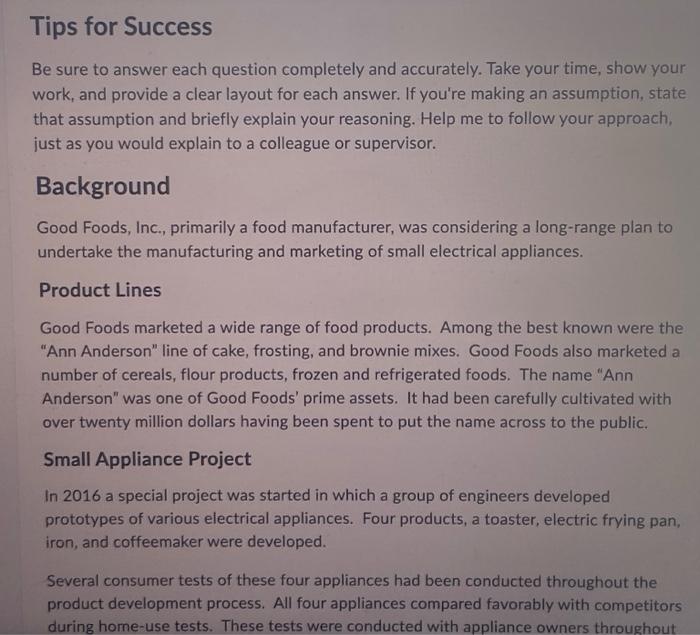
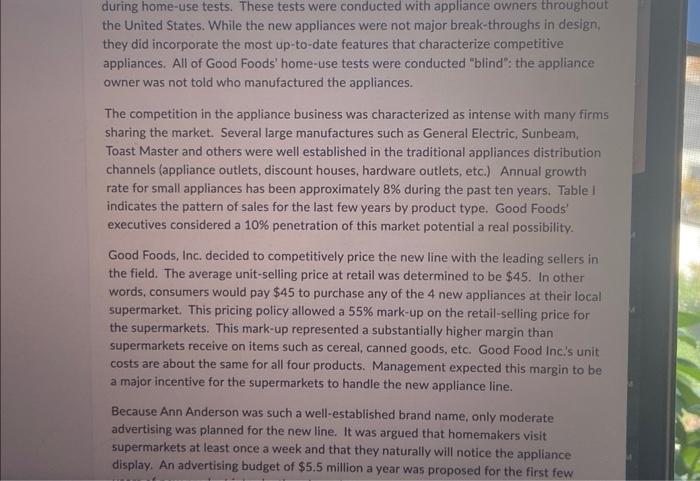
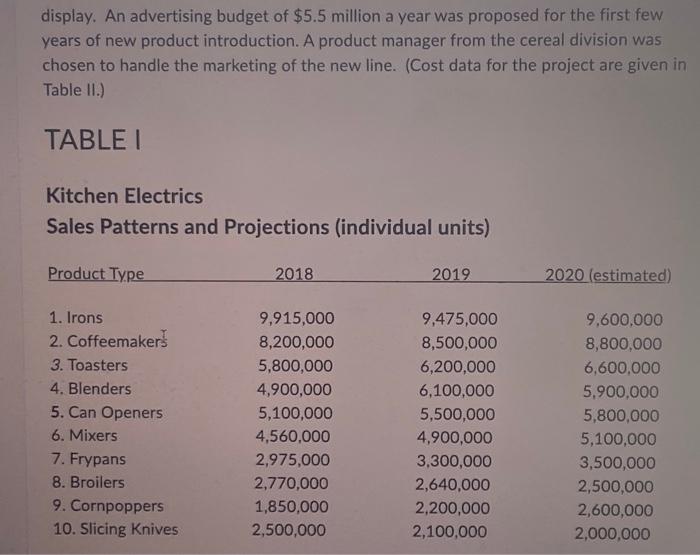
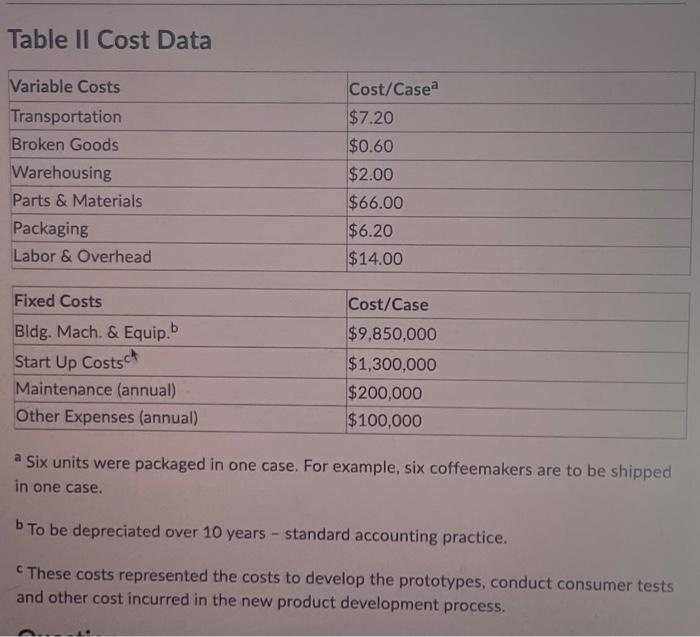
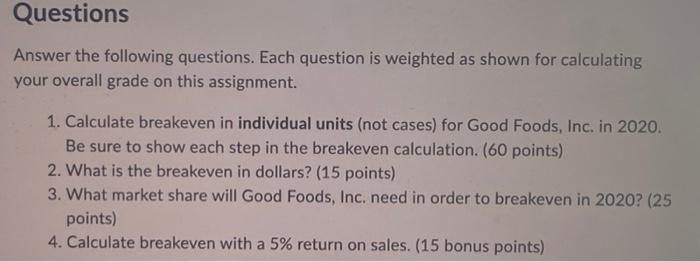
SHOW WORK please
Tips for Success Be sure to answer each question completely and accurately. Take your time, show your work, and provide a clear layout for each answer. If you're making an assumption, state that assumption and briefly explain your reasoning. Help me to follow your approach, just as you would explain to a colleague or supervisor. Background Good Foods, Inc., primarily a food manufacturer, was considering a long-range plan to undertake the manufacturing and marketing of small electrical appliances. Product Lines Good Foods marketed a wide range of food products. Among the best known were the "Ann Anderson" line of cake, frosting, and brownie mixes. Good Foods also marketed a number of cereals, flour products, frozen and refrigerated foods. The name "Ann Anderson" was one of Good Foods' prime assets. It had been carefully cultivated with over twenty million dollars having been spent to put the name across to the public. Small Appliance Project In 2016 a special project was started in which a group of engineers developed prototypes of various electrical appliances. Four products, a toaster, electric frying pan, iron, and coffeemaker were developed. Several consumer tests of these four appliances had been conducted throughout the product development process. All four appliances compared favorably with competitors during home-use tests. These tests were conducted with appliance owners throughout Answer the following questions. Each question is weighted as shown for calculating your overall grade on this assignment. 1. Calculate breakeven in individual units (not cases) for Good Foods, Inc. in 2020. Be sure to show each step in the breakeven calculation. ( 60 points) 2. What is the breakeven in dollars? (15 points) 3. What market share will Good Foods, Inc. need in order to breakeven in 2020 ? (25 points) 4. Calculate breakeven with a 5% return on sales. ( 15 bonus points) Tahlo II r net nata a Six units were packaged in one case. For example, six coffeemakers are to be shipped in one case. bo be depreciated over 10 years - standard accounting practice. c These costs represented the costs to develop the prototypes, conduct consumer tests and other cost incurred in the new product development process. during home-use tests. These tests were conducted with appliance owners througnout the United States. While the new appliances were not major break-throughs in design, they did incorporate the most up-to-date features that characterize competitive appliances. All of Good Foods' home-use tests were conducted "blind": the appliance owner was not told who manufactured the appliances. The competition in the appliance business was characterized as intense with many firms sharing the market. Several large manufactures such as General Electric, Sunbeam, Toast Master and others were well established in the traditional appliances distribution channels (appliance outlets, discount houses, hardware outlets, etc.) Annual growth rate for small appliances has been approximately 8% during the past ten years. Table I indicates the pattern of sales for the last few years by product type, Good Foods' executives considered a 10% penetration of this market potential a real possibility. Good Foods, Inc. decided to competitively price the new line with the leading sellers in the field. The average unit-selling price at retail was determined to be $45. In other words, consumers would pay $45 to purchase any of the 4 new appliances at their local supermarket. This pricing policy allowed a 55% mark-up on the retail-selling price for the supermarkets. This mark-up represented a substantially higher margin than supermarkets receive on items such as cereal, canned goods, etc. Good Food Inc's unit costs are about the same for all four products. Management expected this margin to be a major incentive for the supermarkets to handle the new appliance line. Because Ann Anderson was such a well-established brand name, only moderate advertising was planned for the new line. It was argued that homemakers visit supermarkets at least once a week and that they naturally will notice the appliance display. An advertising budget of $5.5m display. An advertising budget of $5.5 million a year was proposed for the first few years of new product introduction. A product manager from the cereal division was chosen to handle the marketing of the new line. (Cost data for the project are given in Table II.) TABLE I Kitchen Electrics Sales Patterns and Projections (individual units) Tips for Success Be sure to answer each question completely and accurately. Take your time, show your work, and provide a clear layout for each answer. If you're making an assumption, state that assumption and briefly explain your reasoning. Help me to follow your approach, just as you would explain to a colleague or supervisor. Background Good Foods, Inc., primarily a food manufacturer, was considering a long-range plan to undertake the manufacturing and marketing of small electrical appliances. Product Lines Good Foods marketed a wide range of food products. Among the best known were the "Ann Anderson" line of cake, frosting, and brownie mixes. Good Foods also marketed a number of cereals, flour products, frozen and refrigerated foods. The name "Ann Anderson" was one of Good Foods' prime assets. It had been carefully cultivated with over twenty million dollars having been spent to put the name across to the public. Small Appliance Project In 2016 a special project was started in which a group of engineers developed prototypes of various electrical appliances. Four products, a toaster, electric frying pan, iron, and coffeemaker were developed. Several consumer tests of these four appliances had been conducted throughout the product development process. All four appliances compared favorably with competitors during home-use tests. These tests were conducted with appliance owners throughout Answer the following questions. Each question is weighted as shown for calculating your overall grade on this assignment. 1. Calculate breakeven in individual units (not cases) for Good Foods, Inc. in 2020. Be sure to show each step in the breakeven calculation. ( 60 points) 2. What is the breakeven in dollars? (15 points) 3. What market share will Good Foods, Inc. need in order to breakeven in 2020 ? (25 points) 4. Calculate breakeven with a 5% return on sales. ( 15 bonus points) Tahlo II r net nata a Six units were packaged in one case. For example, six coffeemakers are to be shipped in one case. bo be depreciated over 10 years - standard accounting practice. c These costs represented the costs to develop the prototypes, conduct consumer tests and other cost incurred in the new product development process. during home-use tests. These tests were conducted with appliance owners througnout the United States. While the new appliances were not major break-throughs in design, they did incorporate the most up-to-date features that characterize competitive appliances. All of Good Foods' home-use tests were conducted "blind": the appliance owner was not told who manufactured the appliances. The competition in the appliance business was characterized as intense with many firms sharing the market. Several large manufactures such as General Electric, Sunbeam, Toast Master and others were well established in the traditional appliances distribution channels (appliance outlets, discount houses, hardware outlets, etc.) Annual growth rate for small appliances has been approximately 8% during the past ten years. Table I indicates the pattern of sales for the last few years by product type, Good Foods' executives considered a 10% penetration of this market potential a real possibility. Good Foods, Inc. decided to competitively price the new line with the leading sellers in the field. The average unit-selling price at retail was determined to be $45. In other words, consumers would pay $45 to purchase any of the 4 new appliances at their local supermarket. This pricing policy allowed a 55% mark-up on the retail-selling price for the supermarkets. This mark-up represented a substantially higher margin than supermarkets receive on items such as cereal, canned goods, etc. Good Food Inc's unit costs are about the same for all four products. Management expected this margin to be a major incentive for the supermarkets to handle the new appliance line. Because Ann Anderson was such a well-established brand name, only moderate advertising was planned for the new line. It was argued that homemakers visit supermarkets at least once a week and that they naturally will notice the appliance display. An advertising budget of $5.5m display. An advertising budget of $5.5 million a year was proposed for the first few years of new product introduction. A product manager from the cereal division was chosen to handle the marketing of the new line. (Cost data for the project are given in Table II.) TABLE I Kitchen Electrics Sales Patterns and Projections (individual units)











